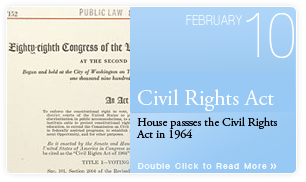House passes the Civil Rights Act in 1964
On this date in 1964, the United States House of Representatives passed the Civil Rights Act of 1964 by a vote of 290-130. The bill was originally introduced in a speech President Kennedy gave in June of 1963 calling on Congress to pass legislation “giving all Americans the right to be served in facilities which are open to the public–hotels, restaurants, theaters, retail stores, and similar establishments,” as well as “greater protection for the right to vote.” A few days later he sent a bill to Congress which was not far reaching enough for many Civil Rights organizations. The bill went first to the House Judiciary Committee, chaired by Emmanuel Celler, a Democrat from New York. The Judiciary Committee ended up strengthening the act, adding provisions prohibiting racial discrimination across public and private employment, ending segregation for publicly-owned buildings and strengthening the language against segregation for public facilities. It also provided significantly more protection for black voters and authorized the Attorney General to file lawsuits on behalf of any individual being deprived of their Constitutional or legal rights. That provision helped protect nonviolent protesters by assuring that they were entitled to their rights to free speech and assembly under the First Amendment, which was very important to Civil Rights organizations. The bill left the Judicial Committee in November of 1963 and went to the Rules Committee where it hit a roadblock. The chairman of the Rules Committee was a Democrat from Virginia, Howard Smith, who wanted to keep the bill stalled indefinitely as a proponent of segregation. The bill remained there through President Kennedy’s assassination but when Lyndon Johnson became President, in his first address he told Congress, “No memorial oration or eulogy could more eloquently honor President Kennedy’s memory than the earliest possible passage of the civil rights bill for which he fought so long.” Celler decided to try to circumvent Smith by having the bill discharged. This was a nontraditional way to move a bill forward that requires a majority of the House to sign a petition thereby moving the bill directly to the House floor. When it became clear Celler would be able to gather enough signatures, Smith relented to avoid humiliation and allowed the bill to pass his committee. After 12 days of deliberation on the floor it passed. The voting was split according to region: 104 representatives were from Southern states, 97 of them voted against the bill. After passing the House, it was sent to the Senate, where it bypassed the Judiciary Committee going straight to the Senate floor where the Southern Senators held a 54-day filibuster to stop it from passing. Eventually it passed the Senate and the bill was signed into law by President Johnson on July 2, 1964. Recognized as landmark legislation, it invalidated Jim Crow laws in the South and accelerated school integration and has had sweeping effects on American society.

